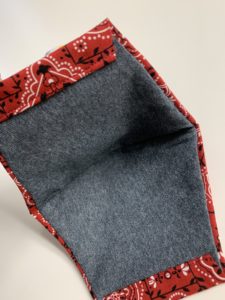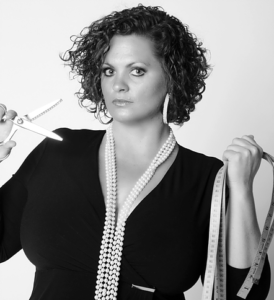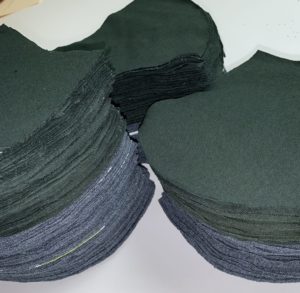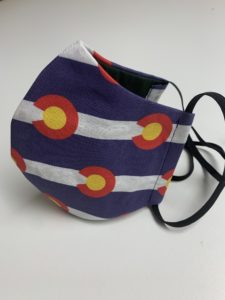
The CSU Homecoming 5K shirts are a staple of the Homecoming 5K race, with their unique, one-of-a-kind designs making them a popular commodity among racers. Once the race is over, though, what happens to all those homecoming shirts that are left after the 5K has come and gone? Where do they all go?
In sticking with Colorado State University’s zero-waste mission, the Department of Health and Exercise Science aims to reuse and recycle all the left-over shirts from the event in ways that benefit the community. All left-over shirts are given to the HES Club, formerly the Wellness Club, which sells off the shirts as a fundraiser for their group activities. Shirts that remain are often sold in future sales or donated to worthy causes.
This year, with the pandemic in mind, the Health and Exercise Science department and the HES Club chose to donate to a cause closer to home, with the leftover race shirts going to Stephanie Carlson, a local fashion designer who makes masks for essential workers and the community. So far, around 350 shirts have been donated to their mask making efforts.
Giving back to the community
“The very day that the whole country shut down, a friend of mine reached out to me and asked me if I could make her and all of her friends some masks,” said Carlson. “Within the next week I had prototypes made, seamstresses and volunteers offering to help with production, and donations flowing in.”
With a community in need and supplies across the country running low, Carlson saw the need and rose to meet it, with her own family in the forefront of her mind.

“My mother is an ICU nurse, my best friend is an ER nurse and I have so many people that I know and love that were working in the healthcare field,” said Carlson. “It was scary to me that they were on the front lines and I wanted to do whatever I could to protect them. My other motivation was this community. I wanted to do everything I could to keep this community that I live in and love so much as safe as possible.”
Carlson is an experienced designer, operating her own brand, Stephanie Carlson Design, out of the Northern Colorado area. A graduate of the Art Institute of Colorado, she is a local favorite and creates ready to wear for curvy women and custom designs. Despite her homegrown roots, her brand is well known, and she has presented her collections on the runway at prominent fashion shows in Denver as well as New York Fashion Week. This extensive background poised her, she expressed, for the mask making phenomenon that grew in the first few months of the pandemic. From there, she has grown the endeavor from a volunteer team to a full-fledged staff.
“I have a staff of five people, including seamstresses at work from their own studios,” Carlson said. “In the beginning, I had a whole team of volunteers helping, and as this went forward, I transitioned some of those people into staff. It was really wonderful to have that team of volunteers helping me in the beginning because it allowed us to donate very large numbers of masks to organizations that needed them.”
Making large quantities with quality in mind
The masks, made of two layers of fabric, incorporate the soft material of the run t-shirts to make them comfortable for long time wear.
“The 5K T-shirts are wonderful material for the masks because it is a nice soft and thick cotton jersey knit,” Carlson explains. The masks have a cotton face and a jersey knit lining because that was what the healthcare workers were requesting. The T-shirts from CSU are unused and a great thick, breathable material. They are really the perfect material to line the masks with.”
“It makes them much more comfortable to wear,” Carlson explained. “Many people have to wear them all day long. The jersey knit, the design of the masks, and the comfort of being able to tie the elastic either around your ears or your head makes them very comfortable for long use wear. There is also an added sustainability factor that is near and dear to my heart. This partnership allows us to use the T-shirts that would otherwise be unused and put them to use in protecting our community.”
Carlson’s work has impacted many throughout the state, and continues to be bolstered by donations and mask sales. For those who can, you can purchase a mask from her store. Proceeds go into her mask making and donation efforts for frontline workers.

“I estimate that we have completed close to 10,000 masks so far,” Carlson said. “We donate them to nonprofit companies that need them, and anybody else through word-of-mouth. To this day, we are still donating masks to those organizations that need them and for every purchase on the website we donate one mask. We have a number of wholesale accounts around the state, and they are sold online through my website.”
Aiming to produce both comfort and style
With the pandemic stretching well into the year and creating a new pattern in people’s lives, another important point arose for Carlson – making a mask people love to wear, no matter the outfit or occasion, that are easy to clean and designed to last.
“The feedback on the masks has been wonderful,” Carlson said. “People love the way they fit, the way they feel on the face, the fact that they have the option to tie them in different ways. People love that the masks are machine washable and that they are able to pair them with their outfits. That is really an important factor, as people want options and beautiful prints and colors that they can accessorize their outfits with.”
Although she is running a design enterprise, Carlson still says that making masks at home for yourself and your neighbors is an important and necessary task for those with the skills and the supplies.
“For those making masks at home, I would say thank you!” Carlson said. “With a pandemic, it takes every person to step in and help keep our communities safe. And those that are donating their own time and materials, that is a real, selfless action. And to those that are just starting there are endless resources available to help guide you through the process, from online classes, to internet videos.”
Keeping efforts local and community focused
For those without a thimble-thumb, there are ways to help Carlson and other local seamstresses and shops supporting the current pandemic – shopping and donating to the cause.

“We are always taking donations via funds or supplies,” Carlson said. “That helps us make a bigger community impact. Donations in the form of fabric cuts the material cost down for us, and any funds pay for the elastic or the packaging or all the little things that go into making the masks. With donations, we are able to help out the community on a much bigger scale.”
In a time where COVID-19 precautions have led to local impacts, spending your money on local endeavors allows these companies to reinvest in supporting the community and help bolster local efforts and the local economy.
“Supporting small businesses during a time like this, and always, is the very foundation of our economy and community,” Carlson said. “Shopping local is what keeps our community alive and breathing. In doing so you are supporting the people you see every day without knowing they are business owners. For me, when people shop my brand, it allows me the opportunity to support others. To pay my staff. With all of us employed it affords us the opportunity to support other local business owners. It is the circle of life, and the most vital part of business.”
Masks continue to be available on Carlson’s website. If you are a local nonprofit business, or you know of a family in need, looking for mask donations, please contact Carlson at stephaniecarlsondesigns@gmail.com. You can also reach out to Carlson for information on how you can donate of fabrics or other items to help her create masks for locals in need.
The Department of Health and Exercise Science is part of CSU’s College of Health and Human Sciences.